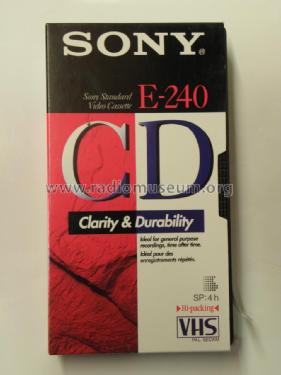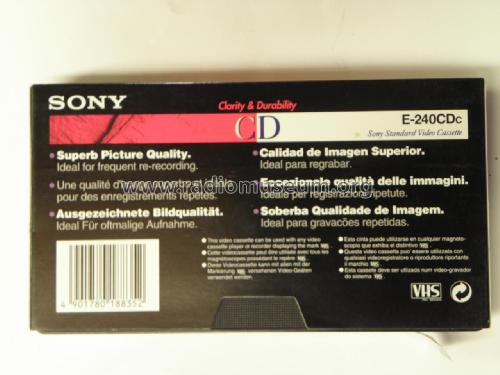VHS Video Cassette All
Sony Corporation; Tokyo
- Country
- Japan
- Manufacturer / Brand
- Sony Corporation; Tokyo
- Year
- 1976 ??
- Category
- Miscellaneous (Other, Various) - see notes
- Radiomuseum.org ID
- 265726
- Wave bands
- - without
- Details
- Special Tape or Cassette-Format
- Power type and voltage
- No Power needed
- Loudspeaker
- - - No sound reproduction output.
- Material
- Plastics (no bakelite or catalin)
- from Radiomuseum.org
- Model: VHS Video Cassette [All] - Sony Corporation; Tokyo
- Shape
- Miscellaneous shapes - described under notes.
- Dimensions (WHD)
- 187 x 103 x 25 mm / 7.4 x 4.1 x 1 inch
- Notes
-
This page is for all SONY labeled VHS type Video Cassette Tapes for all TV standards.
Please do not modify this page. Load only pictures with all data in the picture legend!
Bitte nur Bilder hochladen, alle Informationen/Daten in die Bildlegende.
History (Extracts taken from Wikipedia):
"The Video Home System (better known by its abbreviation VHS) is a consumer-level analog recording videotape-based cassette standard developed by Victor Company of Japan (JVC).
Cassette and tape design
The VHS cassette is a 187 mm wide, 103 mm deep, 25 mm thick plastic shell held together with five Phillips head screws. The flip-up cover that protects the tape has a built-in latch with a push-in toggle on the right side (bottom view image). The VHS cassette also includes an anti-despooling mechanism consisting of several plastic parts between the plastic spools, near the front of the tape (white and black in the top view).
The spool brakes are released by a push-in lever within a 6.35 mm hole accessed from the bottom of the cassette, about 19 mm in from the edge label. There is a clear tape leader at both ends of the tape to provide an optical auto-stop for the VCR transport mechanism.
A light source is inserted into the cassette through the circular hole in the center of the underside when loaded in the VCR, and two photodiodes are located to the left and right sides of where the tape exits the cassette. When the clear tape reaches one of these, enough light will pass through the tape to the photodiode to trigger the stop function; in more sophisticated machines it will start rewinding the cassette when the trailing end is detected.
Early VCRs used an incandescent bulb as the light source, which regularly failed and caused the VCR to erroneously think that a cassette is loaded when empty, or would detect the blown bulb and stop functioning completely. Later designs use an infrared LED which had a much longer lifetime.
The recording media is a 12.7 mm wide magnetic tape wound between two spools, allowing it to be slowly passed over the various playback and recording heads of the video cassette recorder. The tape speed for "Standard Play" mode is 3.335 cm/s for NTSC, 2.339 cm/s for PAL.
Recording capacity
A VHS cassette holds a maximum of about 430 m (1,410 ft.) of tape at the lowest acceptable tape thickness, giving a maximum playing time of about 4 hours in an DF480 for NTSC and five hours in an E-300 for PAL at "standard play" (SP) quality.
Other speeds include "long play" (LP), and "extended play" (EP) or "super long play" (SLP) (standard on NTSC; rarely found on PAL machines).
For NTSC, LP and EP/SLP doubles and triples the recording time accordingly, but these speed reductions cause a slight reduction in video quality – from the normal 250 lines in SP, to 230 analog lines horizontal. The slower speeds cause a very noticeable reduction in linear (non-hifi) audio track quality as well, as the linear tape speed becomes much lower than what is commonly considered a satisfactory minimum for audio recording."
- Author
- Model page created by a member from A. See "Data change" for further contributors.
- Other Models
-
Here you find 4077 models, 3934 with images and 977 with schematics for wireless sets etc. In French: TSF for Télégraphie sans fil.
All listed radios etc. from Sony Corporation; Tokyo
Collections
The model VHS Video Cassette is part of the collections of the following members.

